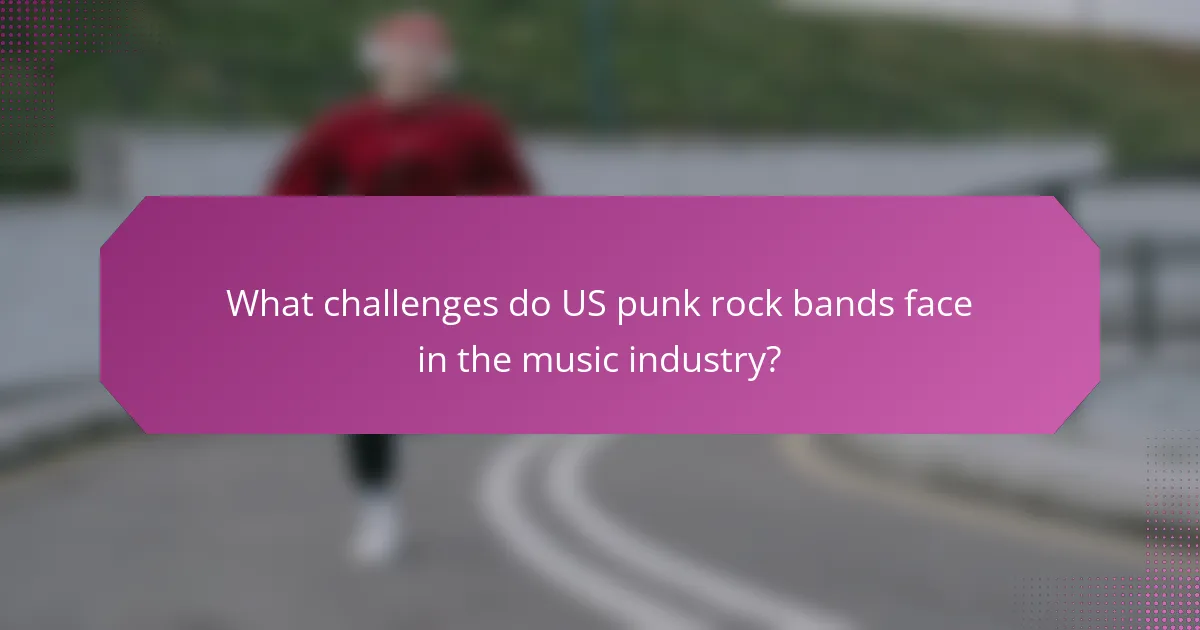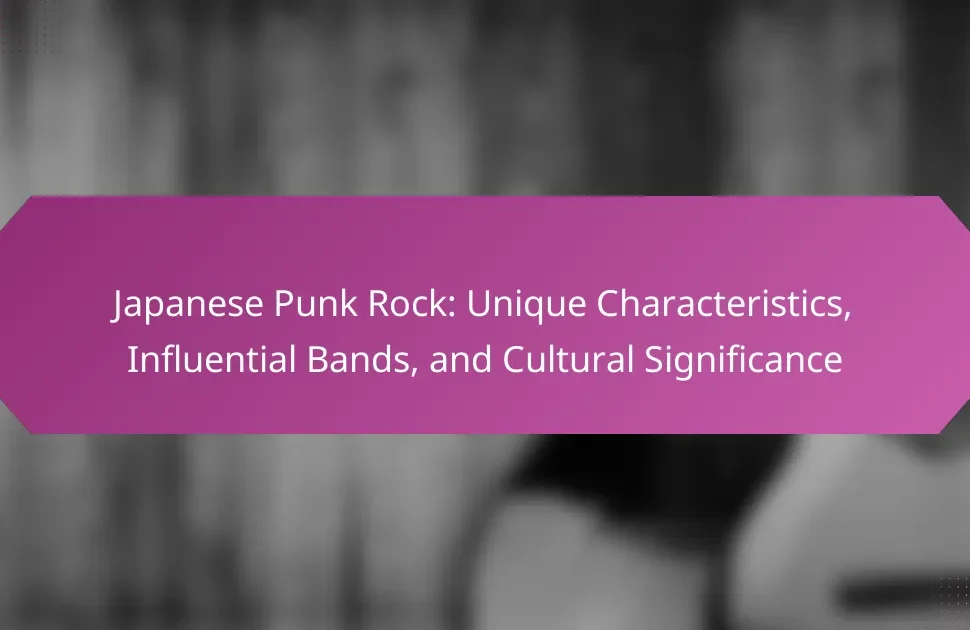US punk rock bands have shaped music history through their rebellious spirit and innovative sounds. This article explores their unique contributions, notable collaborations, and the genre’s evolution over time. Key influences include the DIY ethic and genre fusion with styles like reggae and hip-hop. Additionally, the impact of digital platforms on their reach and engagement with fans will be examined.

What are the defining characteristics of US punk rock bands?
US punk rock bands are characterized by their rebellious spirit, distinctive sound, and cultural impact. They often feature fast tempos, aggressive guitar riffs, and socially conscious lyrics. Notable innovations include the DIY ethic and a focus on authenticity. Collaborations among bands have shaped the genre, with influences from other music styles like reggae and metal. Unique attributes include the emergence of subgenres such as pop-punk and hardcore punk, while rare traits involve regional scenes that fostered local variations.
How do punk rock bands innovate within their music and style?
US punk rock bands innovate through experimentation with sound, style, and collaborations. They blend genres, incorporate diverse influences, and challenge norms. Bands like Green Day and Blink-182 merge pop elements, while others like Bad Brains fuse reggae. Unique attributes, such as DIY ethics and political themes, drive their evolution. Collaborations with artists across genres further expand their creative boundaries, showcasing punk’s adaptability.
What role do punk rock bands play in cultural movements?
US punk rock bands significantly influence cultural movements by challenging societal norms and promoting activism. They serve as a voice for marginalized groups, addressing issues like inequality and political dissent. Bands like The Clash and Dead Kennedys have used their music to inspire change and foster community among fans. Their collaborations with various artists and genres have further broadened the reach and impact of punk rock, making it a vital part of contemporary cultural discourse.

Which US punk rock bands have shaped the genre’s evolution?
Several US punk rock bands have significantly influenced the genre’s evolution. Bands like The Ramones, Black Flag, and Bad Brains introduced distinct sounds and styles that shaped punk’s identity. The Ramones pioneered a fast-paced, melodic approach, while Black Flag emphasized aggression and complexity. Bad Brains integrated reggae elements, showcasing punk’s versatility. Each band’s unique attributes contributed to the genre’s rich tapestry, inspiring countless artists and movements. Their innovations and collaborations have left a lasting impact on punk rock’s trajectory.
How did bands like The Ramones influence punk rock’s sound?
The Ramones significantly shaped punk rock’s sound by introducing a fast, raw, and minimalist approach. Their emphasis on simple chord progressions and catchy melodies set a template for future bands. The Ramones’ distinct style, characterized by short songs averaging around two minutes, influenced countless artists and established a foundation for punk music’s rebellious spirit. Their energetic performances and fashion choices further solidified their role as punk icons.
What impact did bands like Green Day and Blink-182 have on mainstream acceptance?
Bands like Green Day and Blink-182 significantly influenced mainstream acceptance of punk rock. Their catchy melodies and relatable lyrics attracted a broader audience, bridging the gap between underground and popular music. Green Day’s “Dookie” and Blink-182’s “Enema of the State” showcased punk’s energy while incorporating pop elements, making the genre more accessible. As a result, they opened doors for numerous punk and alternative bands in the late 1990s and early 2000s, reshaping the music landscape. Their success demonstrated that punk rock could thrive commercially while retaining its rebellious spirit.

How do collaborations among US punk rock bands foster innovation?
Collaborations among US punk rock bands drive innovation by blending diverse styles and ideas. This fusion creates unique sounds that challenge genre boundaries. For instance, bands like Rancid and The Interrupters often collaborate, resulting in fresh musical elements. These partnerships also encourage experimentation with lyrics and themes, reflecting social issues and personal experiences. As a result, the punk rock scene continually evolves, keeping it relevant and engaging for new audiences.
What notable collaborations have occurred within the punk rock scene?
Notable collaborations in the punk rock scene include influential partnerships such as the one between Rancid and The Transplants, which blended styles and expanded punk’s reach. Another significant collaboration is between Green Day and U2, showcasing punk’s evolution in mainstream music. The collaboration between The Offspring and various artists also highlights genre innovation. Additionally, the work of Blink-182 with various pop artists has pushed punk into new territories. These collaborations illustrate how punk rock continuously evolves through creative partnerships.
How do collaborations affect the creative process of punk bands?
Collaborations significantly enhance the creative process of punk bands by introducing diverse influences and ideas. These partnerships often lead to innovative sounds and lyrical themes, pushing the genre’s boundaries. For instance, collaborations with artists from different genres can result in unique fusions, attracting broader audiences. Additionally, working with producers or other musicians fosters experimentation, allowing bands to develop their style. Such collaborations can also revive interest in established bands, as seen with recent projects that merge punk with electronic or hip-hop elements, demonstrating the genre’s evolving landscape.

What are the unique traits of influential US punk rock bands?
Influential US punk rock bands are characterized by their raw sound, anti-establishment themes, and innovative approaches to music. Key traits include a commitment to DIY ethics, genre-blending, and impactful lyrics that resonate with social issues. Bands like The Ramones and Bad Brains exemplify unique attributes such as high-energy performances and genre-defining styles. Collaborations with artists from other genres have further enriched their sound and expanded their influence. The evolution of punk rock reflects a constant reinvention, making it a dynamic and enduring genre in American music history.
Which punk rock bands are known for their distinct lyrical themes?
Several US punk rock bands are renowned for their distinct lyrical themes, often addressing social issues, rebellion, and personal struggles. Notable examples include the Dead Kennedys, whose lyrics critique political corruption; Bad Religion, known for their philosophical and social commentary; and Green Day, which explores themes of disillusionment and youth angst. These bands exemplify how punk rock serves as a platform for powerful messages and cultural critique.
How does regional influence shape the sound of punk rock bands?
Regional influence significantly shapes the sound of punk rock bands by integrating local culture and social issues into their music. For instance, East Coast punk often features faster tempos and aggressive lyrics, reflecting urban struggles. In contrast, West Coast punk embodies a more melodic style, influenced by the surf culture. Bands like Bad Brains from Washington, D.C. fuse punk with reggae, showcasing unique regional blends. This diversity creates a rich tapestry of sounds, making punk rock a dynamic genre that evolves with its surroundings.

What challenges do US punk rock bands face in the music industry?
US punk rock bands face numerous challenges in the music industry, including limited financial resources, competition from mainstream genres, and difficulties in securing distribution and promotion. These obstacles hinder their ability to innovate and reach wider audiences. Additionally, evolving music consumption trends, such as streaming platforms, impact their revenue models. Collaborations with other genres can provide opportunities but may also dilute their punk identity.
How do punk rock bands navigate the pressures of commercial success?
Punk rock bands navigate the pressures of commercial success by maintaining creative integrity while adapting to industry demands. Many bands prioritize artistic expression over mainstream appeal, often collaborating with independent labels to retain control. Innovations in sound and style help them stand out amidst commercial trends. As a result, bands like Green Day and Blink-182 have successfully balanced their punk roots with broader audiences, showcasing the genre’s evolution.
What are common pitfalls for emerging punk rock bands?
Emerging punk rock bands often face pitfalls such as lack of originality, poor marketing strategies, and ineffective collaboration. These challenges can hinder their growth and visibility in the competitive music landscape.
Many new bands struggle with developing a unique sound, leading to a diluted identity. Additionally, inadequate promotion can result in limited audience reach. Collaborating with the wrong partners may also dilute their artistic vision.
Understanding these common pitfalls can help emerging bands navigate the complexities of the punk rock scene effectively.

How has the punk rock genre evolved in the digital age?
US punk rock has significantly evolved in the digital age through innovations in sound, collaborations across genres, and shifts in distribution methods. Digital platforms have enabled bands to reach global audiences instantly, fostering new collaborations that blend punk with electronic, hip-hop, and pop influences.
The rise of social media has transformed how bands engage with fans, allowing for direct communication and community building. This interaction has led to a resurgence of DIY ethics, with artists self-releasing music and using platforms like Bandcamp and SoundCloud to distribute their work.
Additionally, the genre has seen unique attributes emerge, such as the incorporation of multimedia elements in performances and music videos, enhancing the overall experience. Rare collaborations, like those between punk bands and mainstream artists, have also expanded the genre’s reach and appeal.
Overall, the digital age has not only preserved punk rock’s rebellious spirit but also propelled it into new creative territories.
What role do social media and streaming platforms play in the evolution of punk rock?
Social media and streaming platforms have significantly accelerated the evolution of punk rock. They provide a space for collaboration, exposure, and innovation among US punk rock bands.
Social media enables bands to connect directly with their audience, fostering a sense of community. Platforms like Instagram and Twitter allow artists to share their creative processes, engage with fans, and promote new music instantly. Streaming services like Spotify and Apple Music democratize access to music, allowing lesser-known punk bands to reach wider audiences without traditional label support.
These platforms also facilitate genre-blending, as punk rock artists collaborate with musicians from various genres. This cross-pollination leads to innovative sounds and styles, pushing the boundaries of punk rock. The rapid feedback loop from fans on social media can influence a band’s direction and experimentation, making the genre more dynamic.
Overall, social media and streaming platforms are essential in shaping the contemporary punk rock landscape, enabling innovation and collaboration while expanding the genre’s reach.
How do punk rock bands engage with their audience in modern times?
US punk rock bands engage with their audience through social media, live performances, and collaborations. They utilize platforms like Instagram and TikTok to share music and connect directly. Live shows often incorporate interactive elements, enhancing audience participation. Collaborations with diverse artists expand their reach and introduce new sounds, keeping the genre dynamic. These strategies reflect a unique adaptability that resonates with both loyal fans and new listeners.

What are the future trends for US punk rock bands?
US punk rock bands are increasingly focusing on genre fusion, digital collaborations, and social activism. Innovations include blending punk with pop, hip-hop, and electronic music, creating unique soundscapes. Collaborations across genres are becoming more common, allowing bands to reach wider audiences. Additionally, punk bands are leveraging social media platforms to engage fans and promote activism, reflecting current social issues. This evolution showcases a dynamic future for the punk rock scene in the US.
Which emerging bands are pushing the boundaries of the genre?
Several emerging US punk rock bands are pushing genre boundaries through innovative sounds and collaborations. Notable examples include Turnstile, known for blending hardcore punk with elements of alternative rock, and Amyl and the Sniffers, who infuse punk with garage rock energy. Another standout is the band Dogleg, which combines punk with melodic elements, creating a unique sonic experience. These bands exemplify the evolution of punk rock by experimenting with diverse influences and modern themes.
How can established bands adapt to stay relevant in a changing landscape?
Established US punk rock bands can stay relevant by embracing innovation, collaborating with emerging artists, and evolving their sound. These strategies allow them to connect with new audiences while maintaining their core identity.
Innovations in music production and distribution, such as utilizing streaming platforms, enable bands to reach broader audiences quickly. Collaborations with artists from different genres can introduce fresh influences, attracting diverse fan bases. Additionally, evolving their sound while staying true to punk rock roots helps bands adapt to changing musical landscapes without alienating loyal followers.
For example, bands like Green Day and Fall Out Boy have successfully incorporated pop elements into their music, broadening their appeal. Engaging with social issues relevant to younger generations can also enhance their relevance, as punk rock has historically been a voice for change.
In summary, established punk rock bands can remain significant by innovating, collaborating, and evolving, ensuring they resonate with both long-time fans and new listeners.
What best practices can punk rock bands adopt for longevity in their careers?
Punk rock bands can ensure longevity by embracing innovation, collaboration, and genre evolution. Regularly experimenting with new sounds keeps their music fresh and relevant. Collaborating with diverse artists can introduce new audiences and ideas. Additionally, engaging with fans through social media fosters a strong community. Developing a sustainable business model, including merchandise and touring strategies, is crucial. Finally, maintaining authenticity while adapting to industry changes helps preserve their unique identity.



